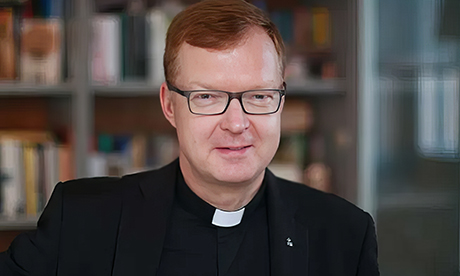Hans Zollner, one of the Catholic Church’s leading figures in the effort to prevent sex abuse, has commended the French Bishops’ Conference (CEF) for revealing that 11 of its members are currently under investigation for such abuse or its cover-up.
But the 56-year-old Jesuit priest, who is director of the Institute of Anthropology at the Rome-based Gregorian University, believes the CEF should also publish the names of those bishops in order to avoid creating a general suspicion of the entire hierarchy.
He explained further in this exclusive interview with La Croix’s Loup Besmond de Senneville.
What’s your reaction to the revelations made by the French bishops’ this week?
Hans Zollner: First of all, I’m really shocked and surprised.
This brings to light a vast failure of the institution over the course of decades. That’s very clear. But paradoxically, I also see a big step forward in this move by the French bishops, even if it comes quite late.
However, there’s an essential dimension that’s missing: the French Bishops’ Conference should publish the names, if this is legally possible.
Without this, there is a risk of creating a generalized suspicion of all bishops.
We must always admit and tell the truth, with the necessary clarity.
Should we move towards transparency of canonical sanctions?
This is a debate that has been going on for years.
It seems clear to me that decisions should be published according to the rules of transparency invoked at the summit on sexual abuse that Pope Francis convened at the Vatican in 2019.
As we can see, we’re fooling ourselves if we think we can hide things in the digital age; sooner or later, things come and there’s a scandal.
This is a rule of communication that we have not yet learned.
Should changes be made?
Yes, they must be made.
We in the Church have not yet understood how communication works in today’s world.
We have to keep in mind that things always come out sooner or later.
Therefore, we must be transparent and sincere while respecting civil law.
As far as the transparency of canonical sanctions is concerned, it is also necessary that the victims have access to them.
This is not the case today.
Should the processes for appointing bishops be reviewed?
We have to differentiate between the issues.
On the one hand, we can never force someone to tell the truth if they do not want to reveal it.
This means that if a candidate has committed prejudicial acts and no one says so, and he does not reveal them himself, no bishop appointment process can take this into account.
On the other hand, changes could be considered for the groups of those questioning the candidate, for example, by turning to people outside ecclesial circles who have known or collaborated with the candidate for the episcopate, even in other contexts.
- Loup Besmond de Senneville has been a journalist with La Croix since 2011 and a permanent correspondent at the Vatican since 2020.
- First published in La-Croix International. Republished with permission.
